ESG investing, also sometimes called sustainable investing, channels money into companies that meet Environmental, Social, and Governance guidelines. ESG investing can be either active ESG investing or passive ESG investing. Active ESG strategies include becoming part owner in a sustainable company, such as a clean energy company.
Passive ESG investing is more accessible to small investors like me. Passive ESG strategies involve investing in funds or building a portfolio of small ESG investments. Investing in the best ESG funds ensures that I will reap good returns, avoid excessive fees, and support responsible corporate behavior.
Just as with other investments, ESG funds can meet diverse investment objectives. One key objective for me is retirement savings. A target date fund is essential to that objective because I can choose a fund designed to switch to more conservative investments as my targeted retirement date approaches.
Knowing that I can keep my money in the fund throughout my career and feel comfortable withdrawing it when I retire makes me feel secure. I plan to retire in 2050 *cocks ear to listen for God’s laughter*.
I can buy target date funds through online apps, firms offering brokerage services, or through my employers’ 401(k). Traditionally, target date funds have yet to provide ESG data, and few target date funds were ESG funds. However, the US Labor Department recently proposed rules easing requirements on fiduciaries (or employers) so that they can consider ESG factors when including sustainable funds in retirement accounts.
Here are some of the best ESG retirement funds with target dates.
Table of Contents
- Best ESG Target Date Funds
- 1. Natixis ESG Target Date Series
- 2. Sustainable Futures ESG Group Plan Solution
- 3. M1 Finance
- 4. LifePath Target Date Funds
- 5. Betterment Retirement Plan
- 6. J.P. Morgan Smart Retirement Funds
- 7. Putnam Investments
- 8. Guidestone MyDestination Fund
- 9. Canada Life Sustainable Target Date Funds
- 10. T. Rowe Price Target Date Funds
- Which Target Date Funds are the Best ESG Funds?
Best ESG Target Date Funds
1. Natixis ESG Target Date Series
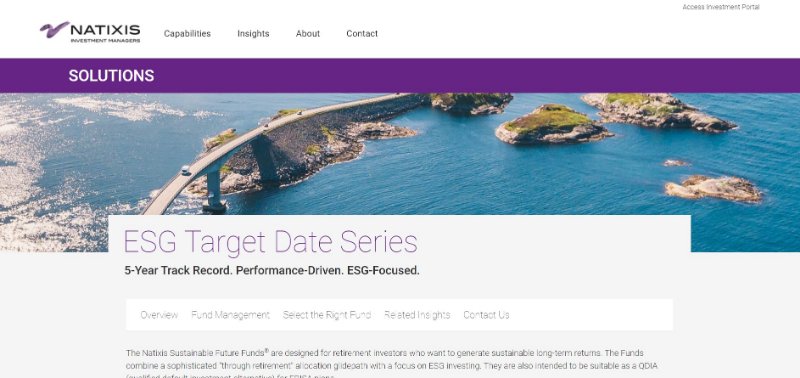
Natixis Sustainable Future Funds help retirement investors achieve long-term returns while meeting ESG investing goals. The funds use both active and passive management strategies.
You can invest in this fund as an individual; however, employers also can offer it as an option in 401(k)s or 403(b)s. Morningstar has given the 2050 fund an overall four-star rating.
The fund is diversified across asset classes, industries, and active and passive strategies. Natixis chooses managers to include in the fund based in part on their record of ESG investments, although the approach each manager uses to ESG investing may differ.
The fund’s top holdings include the WCM Focused International Growth Fund, Institutional Class, and the iShares® ESG Aware MSCI EAFE Exchange Traded Fund. WCM is focused heavily on employee ownership.
The iShares ESG Aware Fund tracks with an index composed of large and mid-cap public companies with positive ESG characteristics. The iShares Fund screens out companies that deal in small arms, conventional military weapons, tobacco, oil sands extraction, controversial weapons, and thermal coal.
Pros
- The four-star Morningstar rating demonstrates that the series represents good value.
- The fund is well diversified.
- The top holdings do meet impact investment objectives.
Cons
- You need to look carefully at each holding in the fund to ensure that the fund meets your definition of sustainable investing. The fund still has a 4.76 fossil fuels exposure, for example.
See Related: Best Emerging Markets ESG Funds
2. Sustainable Futures ESG Group Plan Solution
Sustainable Futures ESG Group Plan Solution is released through several partners, including TransAmerica, Ascensus, Natixis Investment Managers, and LeafHouse Financial Advisors. Only group retirement plans offer this solution, so you’ll have to look for it in your employer’s 401(k).
The program includes Natixis Sustainable Future Funds, which have positive Morningstar ratings. The funds also are well diversified.
The group plan solution includes the Department of Labor-required payroll data checks.
Pros
- You have the option to select this sustainable fund through your employer in a 401(k).
- The fund has a positive Morningstar rating and is well-diversified.
Cons
- The Natixis Sustainable Future Funds prioritize managers based on ESG goals but still include some investments that you may disapprove of. For example, the 2050 fund comprises more than 4 percent fossil fuel exposure.
- Independent reviews of these funds are hard to find, so comparing them with other actively managed ESG funds is difficult.
See Related: Best Impact Investing Books to Read
3. M1 Finance
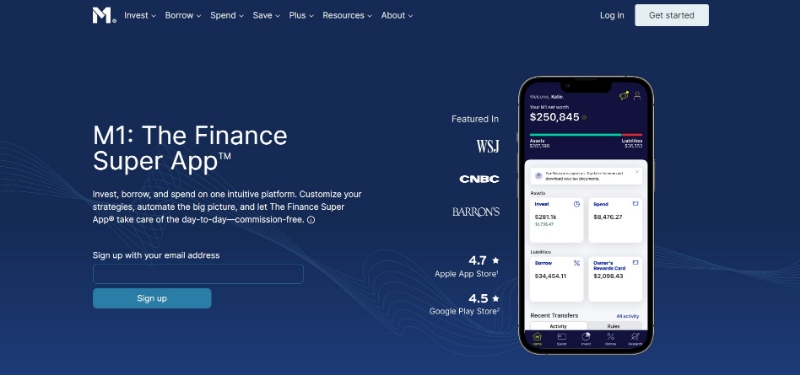
M1 Finance is a personal finance and investment app that provides many services of a brick-and-mortar financial institution. M1 Finance allows self-directed investors to build an investment strategy by allocating a portion of their investments using a pie diagram.
Investors can create their own “pie” or choose one of the curated options. M1 offers target date “pie” or “pie slices” using Vanguard Exchange Traded Funds(ETFs). ETFs are similar to mutual funds, but they are not actively managed.
Investors targeting 2050 can choose from conservative, moderate, or aggressive “pies.” The more aggressive the pie, the greater the potential for gain and the greater the risk. All three Target 2050 pies include the Vanguard S&P 500 ETF and the Vanguard International Bond ETF, both sustainable ETFs.
M1 Finance also offers the option to choose ESG funds for all or part of the pie. These funds are general funds rather than target date funds; however, they are long-term investment options.
Pros
- You don’t need a full-service brokerage service or an employer to invest in the M1 Finance Target Date pies.
- M1 Finance bases its target date pies on Vanguard funds. Vanguard has a solid reputation as a provider of excellent low-cost funds.
Cons
- While some funds in the M1 Finance 2050 pies are sustainable, some do not meet the criteria for ESG factors.
See Related: M1 Finance Review: Is It Legit?
4. LifePath Target Date Funds
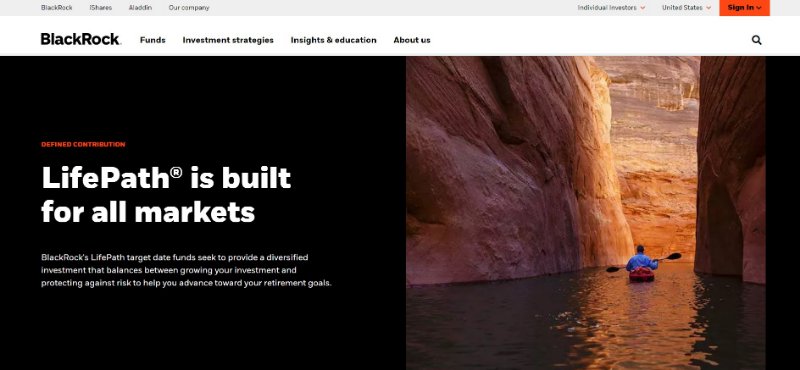
One-fifth of the Fortune 500 companies include LifePath target date mutual funds in their 401(k)s, although individuals can also invest in the funds. LifePath offers an ESG Index Fund. Index funds match or track components of a financial market.
The 2050 ESG Index Fund invests in index building blocks optimized for ESG factors. The fund has a AAA MSCI ESG fund rating and 98 percent ESG coverage, meaning only two percent of the fund’s investments do not meet ESG investing criteria. The fund also has received a Morningstar Gold Award.
The actively managed fund owns about 63 percent US-based investments, 19 percent Europe-based investments, and 7 percent Japanese-based investments. The fund is a BlackRock fund that you can buy through a broker.
The minimum investment is $1,000 unless you establish an automatic investing plan. With an automated program, the minimum investment is only $50.
BlackRock has a wide variety of sustainable investments, many of which are general, not targeted funds.
Pros
- It is a diversified mutual fund with active fund managers.
- Morningstar gives it high marks.
- It also receives high marks from ESG investors and comes from a well-known sustainable fund firm.
- It requires a low minimum investment if you sign up for an automated plan.
Cons
- You cannot buy this on a financial app but only through a broker, financial advisor, or employer.
See Related: Leggett & Platt, Incorporated ESG Profile (LEG): Is It Sustainable?
5. Betterment Retirement Plan
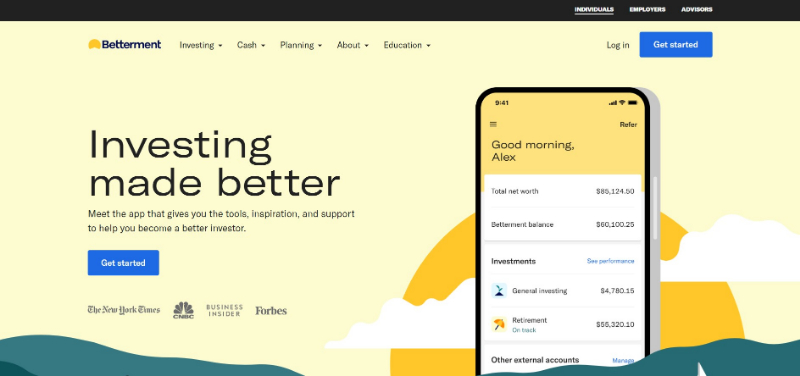
Betterment is an investment app that offers IRAs with socially responsible options. Betterment is unique because it offers choices of socially responsible portfolios based on the issues you consider important.
The app’s technology and information help you become a better investor. The app provides customized investment advice based on your goals and uses low-cost ETFs. You can effectively create your target date fund with sustainable options by setting your target retirement date within the system and choosing your investments.
Betterment has no minimum investment requirement, allowing you to set up automatic investing to fund your customized target date retirement plan a little at a time. Betterment has a free program, but you can access investment advice from humans with the premium plan.
Employers also can use Betterment to set up 401(k) plans for their workforce. Betterment handles all the regulations related to retirement plan participants.
Pros
- You have great flexibility in building your target date retirement account to create your own ESG strategies.
- You can make a low minimum deposit and set up automatic investments to build your retirement plan gradually.
- You only need to deal with a broker or human if you want to do so.
- The low fees mean you keep most of your money.
- The platform offers goal-based tools to keep you on track.
Cons
- Betterment offers ETFs but no mutual funds.
See Related: Best Betterment Alternatives | Apps Like Betterment
6. J.P. Morgan Smart Retirement Funds
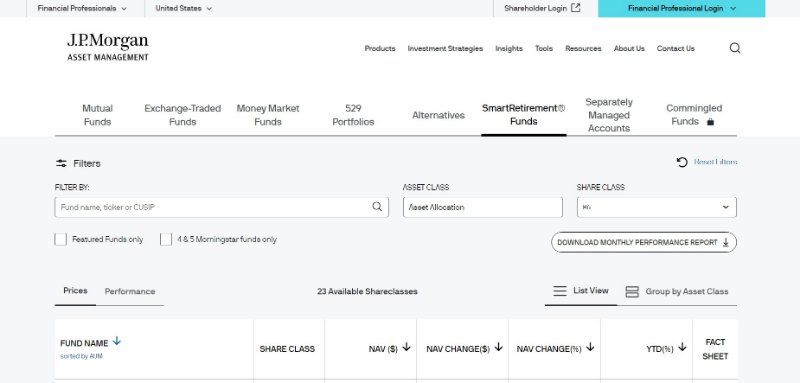
J. P. Morgan Smart Retirement Funds are mutual funds that are actively managed. The company’s multi-asset solutions team manages the diversified Blend 2050 fund. It has a Morningstar Analyst Gold rating and three stars.
The fund invests primarily in equity investments, especially large-cap equity, and international equity. Some fixed income and bonds are included in the portfolio.
Since its inception, the fund has provided returns of about 7.88 percent; however, since the fund is designed to produce in 2050, past performance may not necessarily indicate future performance.
The fund’s managers take ESG factors into account when making investment decisions. The Blend fund receives a fair score based on the ESG practices of the companies in the portfolio.
It receives its best ESG ratings on issues of gender equality and avoidance of firearms and weapons support. Its record is mixed on fossil fuels. It receives poorer ESG ratings on deforestation issues.
Pros
- The Blend 2050 Fund is rated highly, and J. P. Morgan has a good reputation.
- The fund is diversified by asset class and historically performs well.
Cons
- Gender equality is a significant issue for many ESG investors, so this fund is a good choice. If deforestation and the use of fossil fuels were important issues, then another fund may be a better choice.
- You will need to use brokerage services to invest in this fund.
7. Putnam Investments
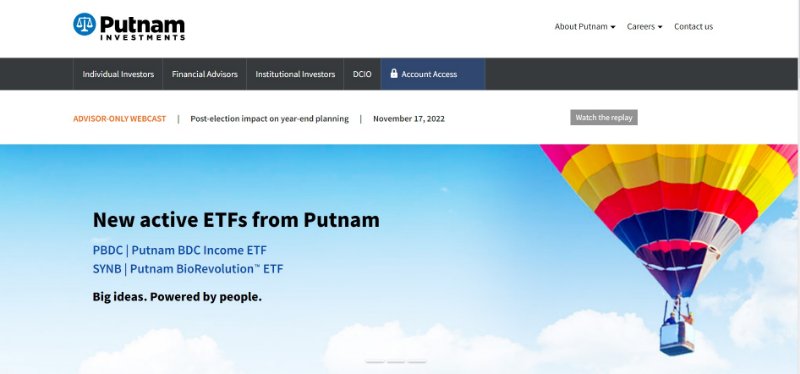
Putnam Investments is creating a brand new suite of sustainable retirement date target funds. The ETFs will focus on investments in companies with ESG practices and will be available in five-year target increments through 2065.
Putnam already offers another target date retirement fund, but it is a general fund without an ESG emphasis. The company says this new fund is part of a continuing program to add sustainable investment opportunities for its customers.
While it’s too early to evaluate these funds fully, Putnam is a well-established company with offices worldwide. The general target date fund, Putnam Retirement Advantage, has received five stars from Morningstar.
Pros
- Based on Putnam’s general target fund, the fund could be an excellent source of retirement income.
- The fund likely will be well-diversified, based on Putnam’s strategy in its other investments.
Cons
- The funds aren’t yet available for investments, so no reviews or performance records are available.
See Related: Best ESG ETFs to Invest in Today (Guide)
8. Guidestone MyDestination Fund
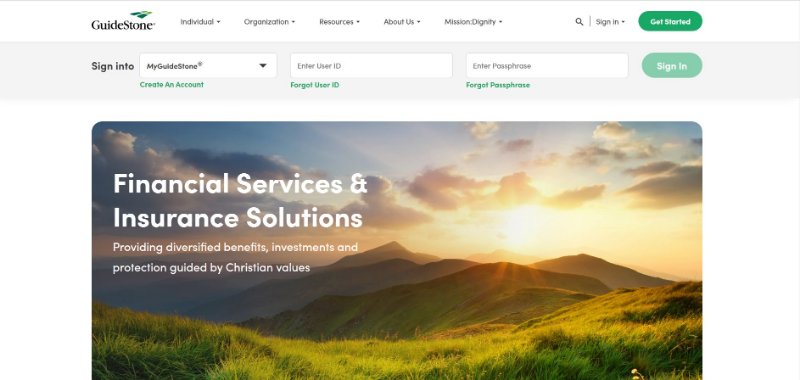
Guidestone Capital Management offers active and passively managed target-date mutual funds screened to avoid certain types of companies. Guidestone is affiliated with the Southern Baptist Convention, and exclusions reflect its values.
The MyDestination funds do not invest in businesses that produce alcohol, tobacco, adult entertainment, or pornography. They also avoid investing in particular stocks related to abortions or gambling.
Guidestone does not have a 2050 target date option. So if I were to choose this fund for my retirement plans, I’d need to put half of my money in the 2045 target date fund and half in the 2055 fund.
The 2045 fund began in 2006 and has delivered a 4.93 percent return since then. The 2055 fund started in 2012 and has provided an 8.10 percent return since then. Both funds receive three stars from Morningstar.
Pros
- This fund offers a good investment option for those whose principles align with the company’s values.
- MyDestination was one of the earliest active ESG funds.
Cons
- While the fund meets the loose criteria of values-based investing and some ESG goals, it only meets some of the goals of ESG investing.
9. Canada Life Sustainable Target Date Funds
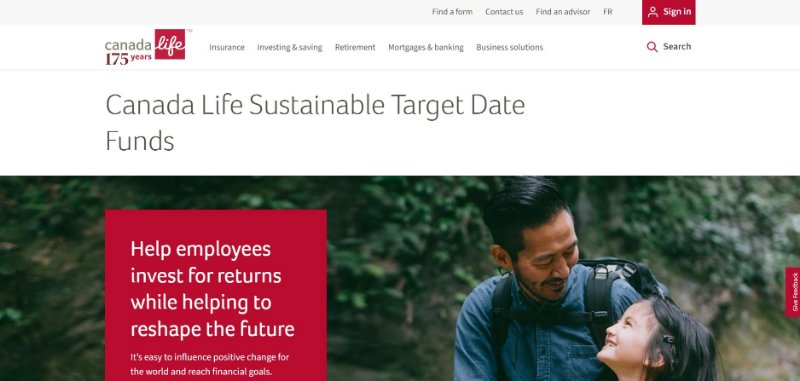
The Canada Life Sustainable Target Date Funds invest in companies striving to make a positive difference in society and the environment. They are globally diversified ESG investments.
They are actively managed and professionally rebalanced. So far, the funds are only available through Canadian employers.
The Canada Life Sustainable funds are relatively new, launched in December 2021. They are the first sustainable target date funds for Canadian employers. J. P. Morgan Asset Managers advise the fund using their ESG analysis tools.
Pros
- These are the first sustainable funds available through Canadian employers.
- J. P. Morgan advises the fund, has a good reputation and great sustainable research tools.
Cons
- These funds are only available through Canadian employers.
- You need to determine whether the fund will have a broad or particular emphasis, such as clean energy.
- Because the funds are new, no expense ratio or other performance data is available.
- This particular investment is too new to evaluate.
See Related: Best Weapon-Free Funds to Invest in Today
10. T. Rowe Price Target Date Funds
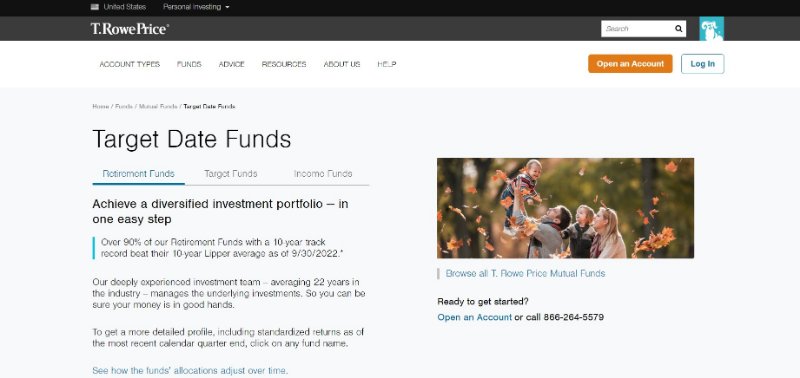
T. Rowe Price doesn’t specifically offer sustainable target date funds. However, it integrates ESG criteria into its investment process. The company has a robust sustainability research tool and details its ESG integration efforts in its annual report.
T. Rowe Price indicates that 90 percent of its long-term target date funds beat the Lipper average. The 2050 fund has a five-star rating from Morningstar and a moderate risk potential.
It has yielded a 6.10 percent return since its inception. The fund’s portfolio comprises about 62 percent domestic and 29 percent foreign stocks. It includes some domestic and foreign bonds.
Pros
- The actively managed fund is highly rated.
- The fund is well-diversified.
- T. Rowe Price has an excellent sustainability research tool for ESG integration.
Cons
- The funds aren’t specifically ESG mutual funds.
Which Target Date Funds are the Best ESG Funds?
The best fund will vary depending on investment goals and preferences. For example, do you prefer ESG ETFs or ESG mutual funds, or does it matter?
The choices also depend on which ESG principles you decide are the most important. ESG is such a broad tagline. It encompasses a variety of impact investing opportunities.
For example, it could include positive screening and active investment in renewable energy sources, or it can be sustainable investing because it excludes certain companies or industries. Some sustainable companies also have active shareholder activism. However, personally, I am a more passive investor and not inclined to heavy shareholder engagement. But that’s just me.
Finally, you need to decide how vital a track record is. Many companies have just introduced sustainable target date funds. You can estimate the performance of the ESG funds based on the performance of the companies’ other funds; however, estimates are different from having hard data such as historical performance and expense ratio.
Related Resources
- Best Climate Change Mutual Funds
- Best Gun-Free Funds to Buy Today
- Best Energy Funds: What You Need to Know
Kyle Kroeger, esteemed Purdue University alum and accomplished finance professional, brings a decade of invaluable experience from diverse finance roles in both small and large firms. An astute investor himself, Kyle adeptly navigates the spheres of corporate and client-side finance, always guiding with a principal investor’s sharp acumen.
Hailing from a lineage of industrious Midwestern entrepreneurs and creatives, his business instincts are deeply ingrained. This background fuels his entrepreneurial spirit and underpins his commitment to responsible investment. As the Founder and Owner of The Impact Investor, Kyle fervently advocates for increased awareness of ethically invested funds, empowering individuals to make judicious investment decisions.
Striving to marry financial prudence with positive societal impact, Kyle imparts practical strategies for saving and investing, underlined by a robust ethos of conscientious capitalism. His ambition transcends personal gain, aiming instead to spark transformative global change through the power of responsible investment.
When not immersed in the world of finance, he’s continually captivated by the cultural richness of new cities, relishing the opportunity to learn from diverse societies. This passion for travel is eloquently documented on his site, ViaTravelers.com, where you can delve into his unique experiences via his author profile.
